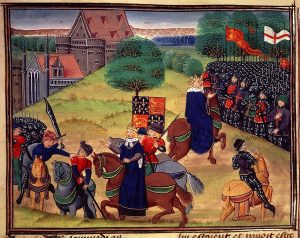Derek Crosby, a PhD student in Medieval History at Queen’s, reflects on politicians’ and journalists’ recent uses and abuses of the medieval past
During the Conservatives’ recent bluster about ‘Britishness’ and ‘British Values’ in education, the Magna Carta was evoked as an example of the latter, which leads this labouring doctoral student to believe that Cameron and Gove do not consider accurate fact-checking to be among those virtues. Perhaps the virtue of fact-checking was edged out by ” the Union Flag, football and fish and chips“. The anniversary of the first sealing of the charter fell last Friday, and doubtlessly it seemed an apt time to show off a bit of 1066-and-all-that memorising, without the critical analysis encouraged in historical teaching.
Unfortunately for the Prime Minister (but to the great glee of critics), he seems to have conducted his research using an Edwardian book for children, Our Island History (available for free here), and hence has fallen into the heffalump trap of declaring the Magna Carta to be “the foundation of all our laws and liberties”. Labour similarly declared the charter to be the world’s first bill of rights. Cameron is by no means the first global leader to make this blunder: Franklin Roosevelt called it proof of the democratic ideal ‘blazing anew’ in the Middle Ages in his 1941 inaugural address. More recently, the Charter had a brief cameo in Robin Hood, (Ridley Scott, 2010) – for those of you that haven’t seen the film, or don’t want to remember it, the document is portrayed as constitution based of universal rights, drawn up by Robin Hood to end a war between the Barons and King John I. His exhortation for ‘freedom‘ may be found here, and it falls into the same quaintly anachronistic camp as Braveheart and Kingdom of Heaven, in which a character exhorts the muck-splattered illiterate peasants surrounding him on a post- enlightenment conceptualisation of freedom, to which said rabble cheer and rattle their pikes/swords/polystyrene shields.
If Mr Cameron was hoping for similar adulation, he was sorely mistaken, and he got a well deserved kicking from online sources and newspapers for his spurious claims. Some of the criticism centred around his glossing over of the anti-semitic and misogynist clauses, but most of it focussed on his ignorance of the full implications of the world ‘free’. Guardian commentator Charlie Brooker wrote that at the time of the sealing “Plebs… had the same human rights as a parsnip”, but his exaggeration contains a certain measure of truth: only one of the charter rights is universal, and almost all specifically excluded those who were in bondage (including an article which said that lords and barons could only be fined by their equals). In reality, the charter was not a civil accord in which the monarch granted all in the land freedom from tyranny, but rather a peace treaty between a losing King John and the victorious barons after their recent rebellion, in which the barons secured guarantees of customary rights and managed to squeeze some more leverage out of the desperate king. The charter was not even the first instance of an accord between ruler and subjectsThese were also signed during the reigns of Henry I, Stephen of Blois, Henry II and Edward the Confessor as part of their coronation charters.
Amidst the barrage of criticism, social commentator Owen Jones piped up in The Guardian that he didn’t consider the Magna Carta to be part of the British tradition of liberty. His point is fine in its own right, but he then went on to cite the Peasants’ Revolt of 1381 as part of that “history, of struggle from below against those in power”, framing the rising as the first blow of “defiance against the ruling elite”, citing the high level of female involvement and the teachings of Wycliffite preacher John Ball. Again, here is a blanket generalisation made to ensure that nuanced truth doesn’t get in the way of a good bit of contemporary polemic. The demands of the various risings in the summer of 1381 were far from homogenous, and although there were some radical demands, the overwhelming majority were nostalgic calls for customary rights. Jones was not the only pundit to name-check the Revolt, with Boris Johnson comparing the success of Euro-sceptics to both the Peasants’ Revolt of 1381 and the Jacquerie of 1358, led by ‘pitchfork-wielding populists‘. His article makes the same assumptions of the Revolt: populism and anti-establishment rhetoric, when in fact much of the 1381 revolt had a distinctly monarcho-populist and conservative ideological core, with “king and true commons” being the watchword of the crowds. A final note on that word: the Mayor of London’s use of the terms peasants is (perhaps unwittingly) quite accurate: many of the recent UKIP voters were of a roughly middling status, just as many of the so called “peasants” were.
The point of this piece (if there is one) is that the events and documents of history were just as nuanced, subtle and irreducible as those of today, and to attempt to reduce them to fit in with an ideological point is not only fallacy, it is foolish, in an age where information on such antiquities is readily available. Although I’m inclined to remember the MST3K mantra when films misstep, the endorsement of such shoddy research from elected officials and public figures attempting to shape national policy and identity is inexcusably half-baked.
During the 1381 revolt the Abbey of St Alban’s was attacked and the citizens demanded that the abbot bring out a charter which they believed the Abbey held, one which guaranteed all of the liberties they felt they were due, one with “capital letters, one of gold and one of azure”. The document did not exist, and neither does Cameron’s version of the Magna Carta. A full transcription of the 1215 charter may be found here, with notes on the various clauses omitted or amended in later productions.

